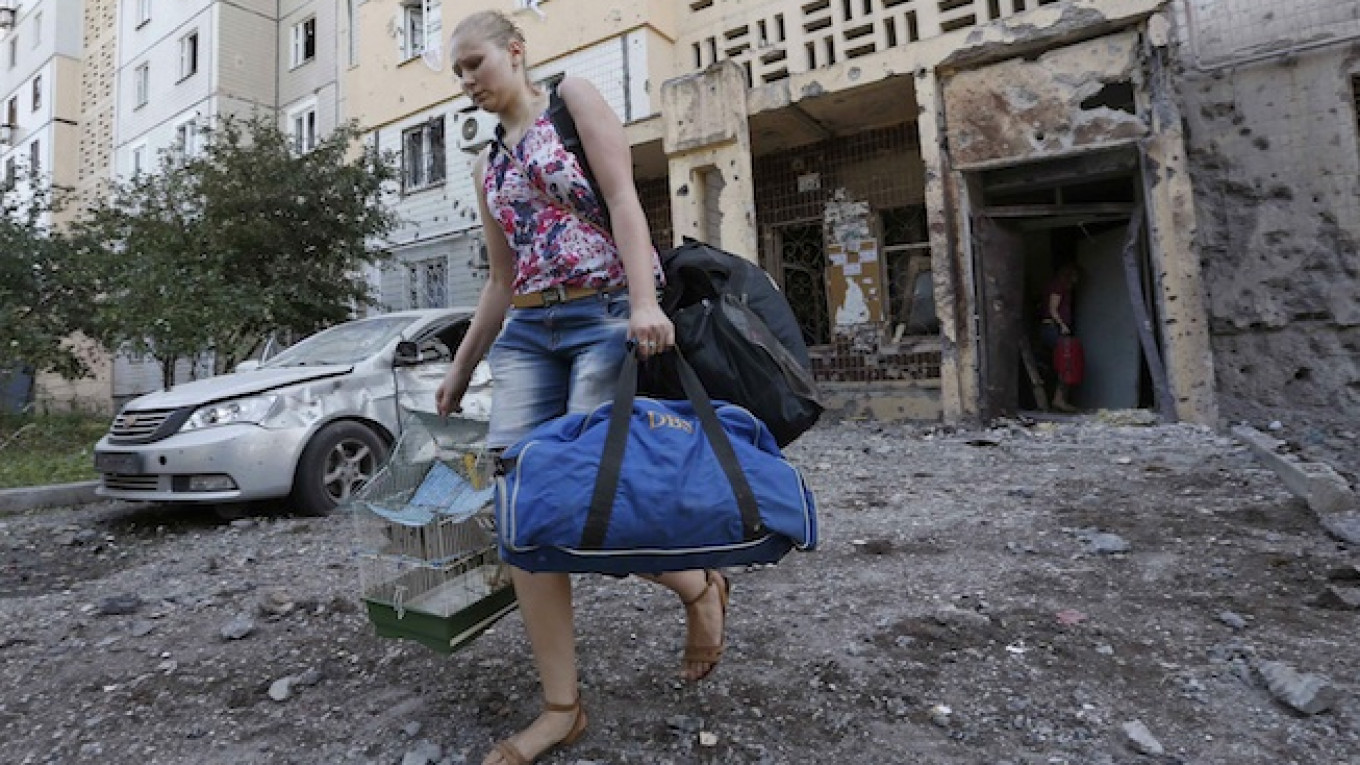During a news conference in Moscow last week, Russian Foreign Minister Sergey Lavrov criticized laws-of-war violations by Ukrainian government forces, referring to a Human Rights Watch report I wrote about the government's unlawful use of unguided rockets in populated areas. Since Lavrov is concerned about laws-of-war violations, there are other issues he should be speaking out about, and other audiences he should address.
Recently I was present when local authorities started exhuming 14 bodies from a mass grave in Sloviansk. Local authorities appear to have identified at least some of the bodies as having been detained and killed by Moscow-backed insurgent forces when they were in control of the city from mid-April to early July. In fact, after the insurgent forces fled Sloviansk, journalists found execution orders in the secret service building that they used for headquarters and detention facility.
Human Rights Watch documented in detail that these same insurgent forces have been running amok — taking, beating and torturing hostages, as well as wantonly threatening and beating people who are pro-Kiev. We also documented that they are implicated in at least one targeted killing of a prominent local political activist.
Insurgent forces, so strongly supported by Russia, have also committed other violations. In a report released yesterday, Human Rights Watch documented that insurgent forces have endangered medical staff and patients, violating the laws of war. The insurgent forces have threatened medical staff, stolen and destroyed medical equipment and hospital furniture, occupied hospital buildings and wards, and expropriated ambulances for transporting active fighters.
Now, back to the rockets. The use of unguided rockets, including so-called Grad rockets, has become a significant problem in the armed conflict in eastern Ukraine and has been a major cause of civilian deaths and injuries. Grad rockets are especially nasty weapons. For one, they are notoriously imprecise. At its maximum range of some 20 kilometers, the most common rocket is only accurate within a rectangle of 336 meters by 160 meters, which means that it is not accurate at all. We believe that Grad rockets should never be used in populated areas because of the very high risk that civilians will be killed and injured.
Another problem with Grads is that they are often fired in salvos. Within seconds, a Grad rocket launcher can fire off its 40 rockets, raining them down like hail (grad in Russian) on an area. The low-pitch rumbling that 40 or more rockets create when they explode in the distance is terrifying. I can't imagine what it is like to be in the center of that storm.
Unfortunately, many civilians in eastern Ukraine can. In a recent Human Rights Watch report, we investigated four Grad rocket attacks that had struck populated areas in Donetsk, killing 16 and injuring many more. We examined impact craters, which side of the buildings the rockets struck, whether there were any military targets nearby, and where insurgent and government forces were located at the time of the attacks. Our conclusion was that Ukrainian government forces were likely responsible for these attacks, which had Lavrov concerned.
But government forces are not the only ones to fire Grad rockets into civilian areas. In the end of July, Grad rocket salvos twice hit Olenivka, a small town just south of Donetsk controlled by Ukrainian armed forces. According to local authorities, the two attacks injured four civilians, destroyed eight houses and damaged 12, including a school. Using the same methodology we established that this time insurgent forces were most likely responsible. Firing Grad rockets into populated areas is equally unlawful when done by insurgent forces.
Lavrov was happy to draw attention to our report establishing that Ukrainian government forces committed violations of the laws of war and calling on Kiev's international supporters to put pressure on the government to end these violations. But Moscow has a particular responsibility vis-à-vis the insurgent forces it is supporting.
If Lavrov finds our report on the government's use of unguided rockets credible enough to cite in a news conference we hope that he will take a close look at our reports detailing violations by the insurgents as well. We are looking forward to his next news conference and his condemnation of all violations, even when they are committed by the insurgent forces.
Ole Solvang is a senior researcher and security adviser at Human Rights Watch.
A Message from The Moscow Times:
Dear readers,
We are facing unprecedented challenges. Russia's Prosecutor General's Office has designated The Moscow Times as an "undesirable" organization, criminalizing our work and putting our staff at risk of prosecution. This follows our earlier unjust labeling as a "foreign agent."
These actions are direct attempts to silence independent journalism in Russia. The authorities claim our work "discredits the decisions of the Russian leadership." We see things differently: we strive to provide accurate, unbiased reporting on Russia.
We, the journalists of The Moscow Times, refuse to be silenced. But to continue our work, we need your help.
Your support, no matter how small, makes a world of difference. If you can, please support us monthly starting from just $2. It's quick to set up, and every contribution makes a significant impact.
By supporting The Moscow Times, you're defending open, independent journalism in the face of repression. Thank you for standing with us.
Remind me later.






